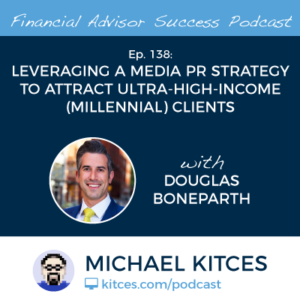 Welcome back to the 138th episode of Financial Advisor Success Podcast!
Welcome back to the 138th episode of Financial Advisor Success Podcast!
My guest on today's podcast is Douglas Boneparth. Douglas is the founder of Bone Fide Wealth, an independent RIA based in New York City that manages nearly $80 million of assets under management for 100 client households.
What's unique about Douglas, though, is that after starting out in a fairly traditional broker-dealer business model serving affluent retirees, he decided to shift and focus on serving a niche of very high-income millennials, most of whom make half a million to $1 million per year in income.
In this episode, we talk in depth about Douglas's niche of working with ultra-high-income millennials. Why he chose to invest so heavily in a younger clientele that's investing in themselves with high student debt loads that often precede their high-income jobs, the way he structures his fee as a combination of a traditional AUM fee plus a flat annual planning fee of $2,000 and $10,000 that's waived once the client reaches half a million of assets under management, because his clients are so high income, they often reach his asset minimums quite quickly, and how he's been able to be so effective with a media- and PR-driven marketing strategy that he's used to attract such high-income millennial clients to himself in the first place.
We also talk about how Douglas structures his own advisory firm. The reason he decided to transition from being a registered rep with Commonwealth as his broker-dealer to become an independent RIA but stay with Commonwealth to provide his RIA support services, why he decided to stop implementing term insurance policies himself for his clients even though he views life insurance as a critical element of the financial plan, and how he sees the rise of millennial-oriented do-it-yourself technology platforms and financial services as the key to being able to work with and support his own millennial clients.
And be certain to listen to the end, where Douglas shares his views on why the industry still has such a difficulty attracting millennials to become financial advisors, his own advice for young advisors looking to get started in the advisory business on how to navigate the sales culture that still exists at many large firms that do the bulk of the industry's next-generation hiring, and the path he pursued from starting out in his father's advisory practice to eventually deciding to break the traditional industry mold and build the advisory business he wanted to build for himself instead.


